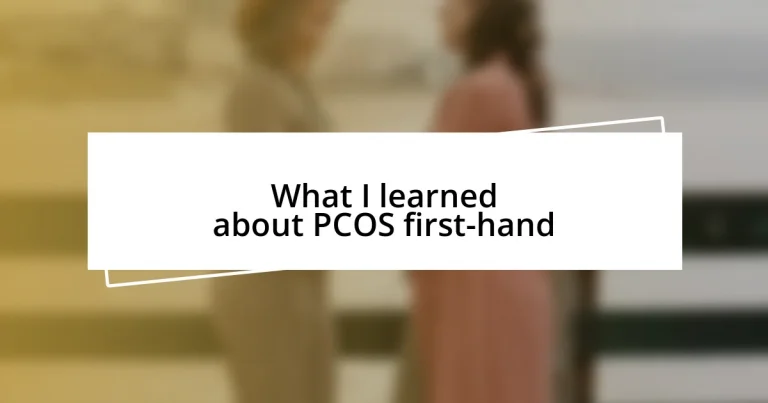Key takeaways:
- PCOS is a hormonal disorder impacting menstrual cycles, weight, and emotional health, often linked to insulin resistance.
- The diagnosis process is vital; being open about symptoms and undergoing tests can lead to effective management strategies.
- Empowering lifestyle changes, including diet, exercise, and emotional support, play a crucial role in managing PCOS symptoms.
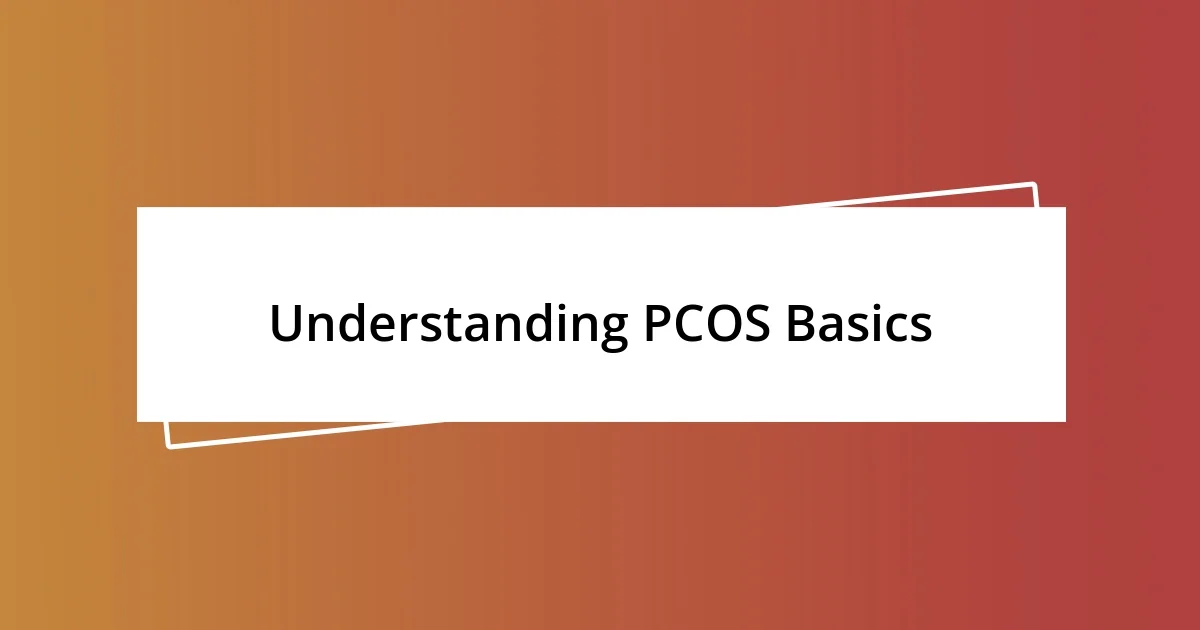
Understanding PCOS Basics
Polycystic Ovary Syndrome (PCOS) is a hormonal disorder that affects many women, often manifesting in irregular menstrual cycles, weight gain, and acne. I remember the overwhelming frustration I felt when I received my diagnosis—suddenly, everything made sense. Have you ever had that moment where you realize the underlying reason for so many of your struggles?
What struck me most about PCOS is its impact on every aspect of life. It’s not just a medical condition; it challenges your mental health too. I often found myself feeling isolated, wondering why I couldn’t just be like everyone else. The emotional toll really hit home when I saw friends effortlessly managing their fertility while I grappled with uncertainty.
As I dug deeper into the intricacies of PCOS, I learned that it’s often linked to insulin resistance. This means that our bodies struggle to use insulin effectively, leading to increased blood sugar levels. Knowing this helped me understand the importance of lifestyle choices in managing symptoms. Have you explored how diet and exercise can influence your experience with PCOS? I found that small changes made a significant difference for me—it’s empowering to take control of something that once felt so uncontrollable.
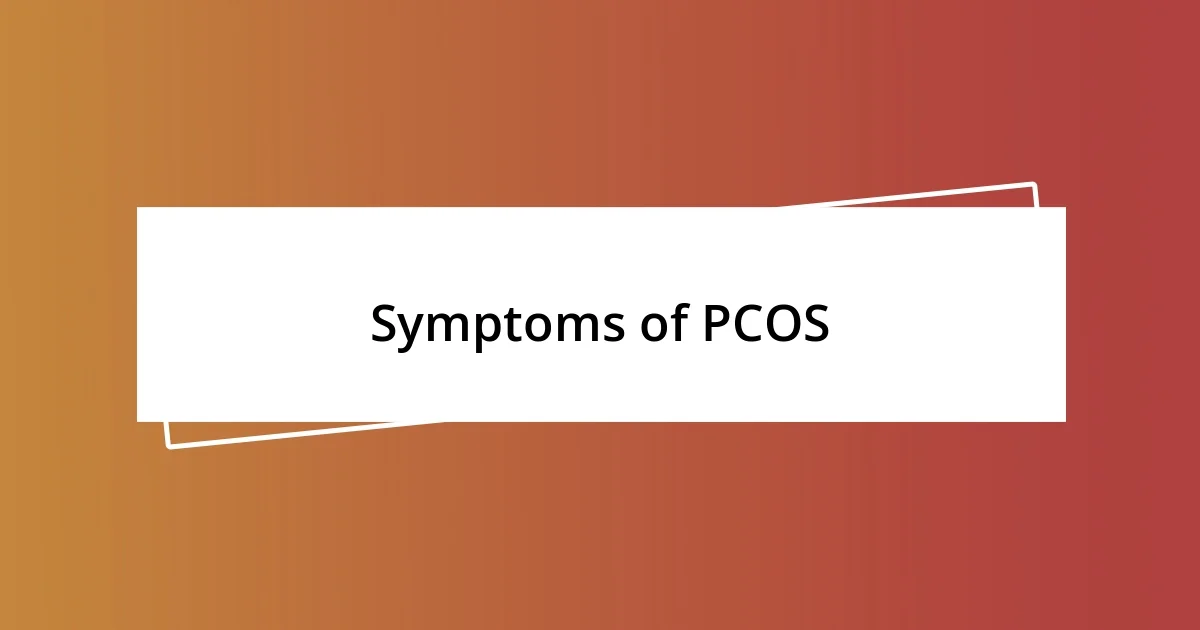
Symptoms of PCOS
As I navigated my own journey with PCOS, I became intimately familiar with its symptoms. Initially, I noticed my menstrual cycles were a chaotic rollercoaster, sometimes skipping months or showing up unexpectedly. This unpredictability was like living with a clock that didn’t tick correctly. It wasn’t long before I also experienced weight gain despite my best efforts, which left me feeling defeated and frustrated.
Some symptoms that I experienced and learned about include:
- Irregular or absent menstrual periods
- Excessive hair growth on the face and body (hirsutism)
- Thinning hair or hair loss on the scalp
- Acne and oily skin
- Dark patches of skin, particularly around the neck and underarms
- Difficulty losing weight or unexplained weight gain
These aren’t just symptoms; they can be powerful reminders that something is off. For instance, seeing hair growing in places I never expected was a wake-up call. I remember feeling a mix of denial and embarrassment when I first noticed it. It was a constant reminder of my struggle with PCOS and, at times, it felt like I was losing a part of my identity. Each symptom brought its own set of challenges and emotions, but gradually, I learned to embrace this journey, focusing on understanding my body instead of just fighting against it.
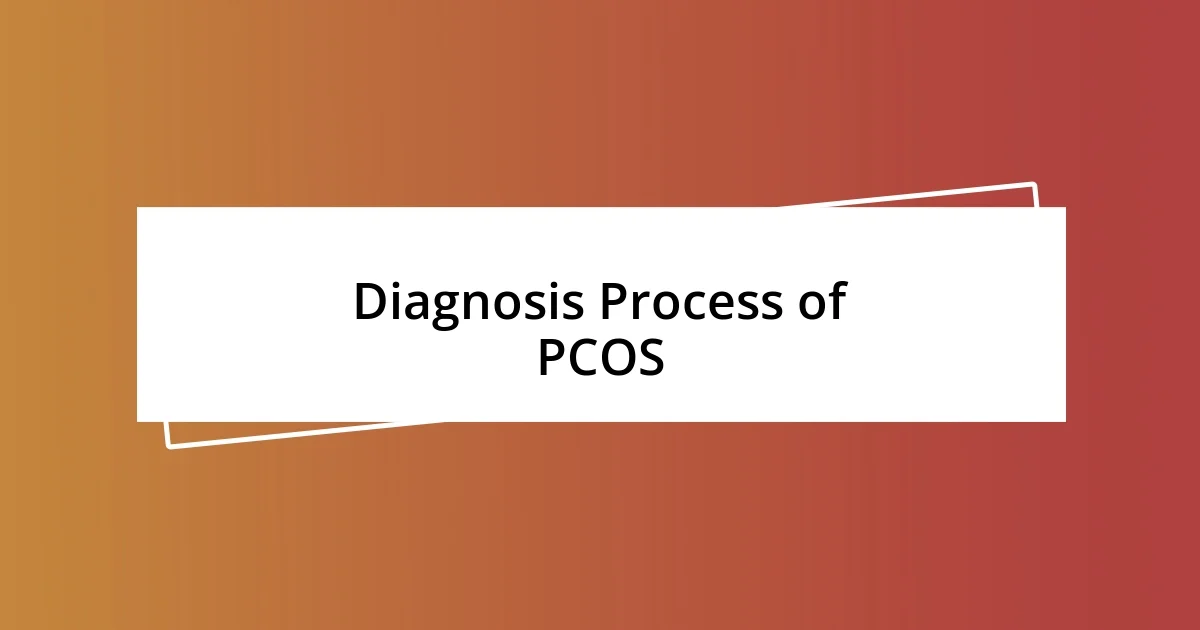
Diagnosis Process of PCOS
The diagnosis process for PCOS can feel like wading through fog, filled with uncertainty and unfamiliar terms. My personal journey began with a visit to the doctor after I had noticed irregularities in my cycles and sudden weight gain. It was during this time that I learned how critical it is to be open about every symptom you’re experiencing—no matter how small they may seem. Have you ever held back details from your doctor out of embarrassment? I know I did, until I realized that complete honesty is crucial for accurate diagnosis.
Once I found the courage to share everything, my doctor suggested a series of tests, including blood tests to check hormone levels and an ultrasound to take a closer look at my ovaries. That was a pivotal moment for me; seeing the images of my ovaries on the screen felt surreal. I couldn’t help but wonder if those small cysts represented years of unrecognized struggles. The experience taught me that diagnosing PCOS is both an art and a science. It requires patience, thoroughness, and a bit of vulnerability on the patient’s part as well.
Ultimately, receiving the diagnosis was both a relief and a source of fear. I felt validated but also overwhelmed with what lay ahead. These mixed emotions can be common in this process. Maintaining an ongoing dialogue with healthcare providers allowed me to address my concerns and better understand my condition. How has your communication shaped your health journey?
| Step in Diagnosis | Description |
|---|---|
| Initial Consultation | Discuss symptoms and medical history with your healthcare provider. |
| Physical Examination | Your doctor may perform a pelvic exam to check for signs of PCOS. |
| Blood Tests | Blood tests are done to measure hormone levels and assess insulin resistance. |
| Ultrasound | An ultrasound may be utilized to look for cysts on the ovaries. |
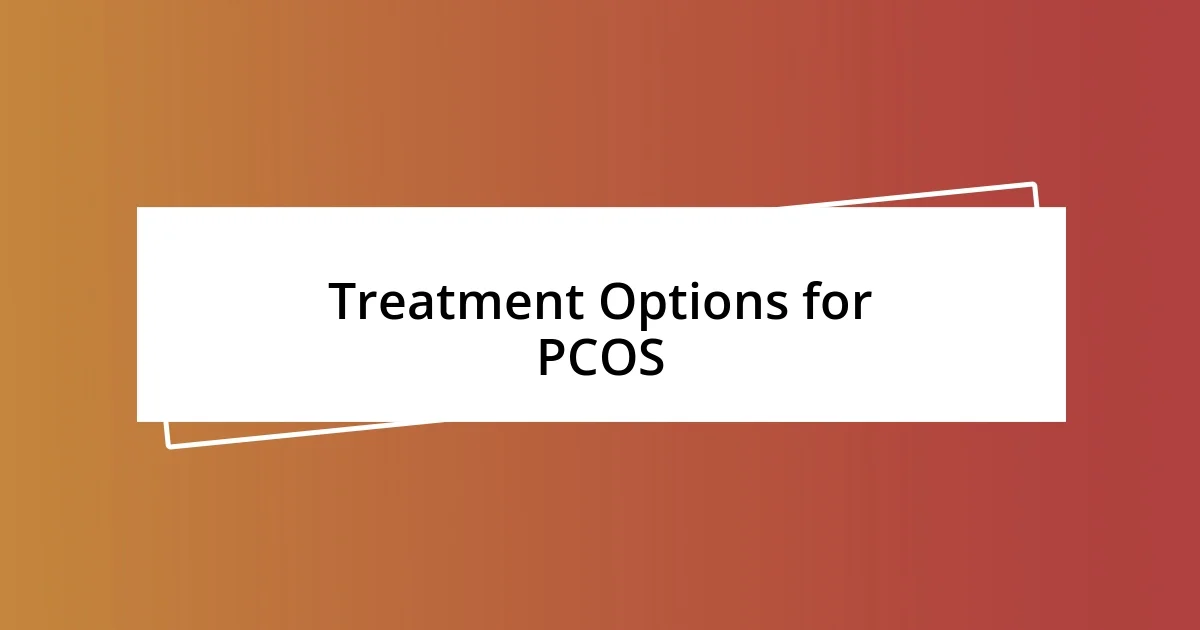
Treatment Options for PCOS
The treatment options for PCOS are as varied as the symptoms themselves, which can make it overwhelming. One of the first things I explored was lifestyle changes, particularly diet and exercise. Integrating a balanced diet rich in whole foods and regular physical activity was a game-changer for me. Have you ever noticed how even small adjustments can lift a heavy weight off your shoulders? I remember feeling lighter—not just physically, but mentally, as I gained a sense of control over my body.
Medications also play a significant role in managing PCOS. For instance, my doctor prescribed birth control pills to regulate my hormone levels and alleviate some of the more distressing symptoms like acne and irregular periods. At first, I was hesitant about taking medication, wondering if it was just a band-aid solution. But after a few months, I was surprised by how much my symptoms improved. Has anyone ever recommended something to you that you were initially skeptical about? Sometimes, it takes that leap of faith to discover what helps us heal.
In addition to these strategies, I found that supplements like inositol were beneficial. I started incorporating them into my routine after doing some research and speaking with my healthcare provider. This journey of trying new things can feel like a treasure hunt, where you sift through options until you find what truly resonates with you. Wouldn’t it be nice if every trial felt like a clear win? My experience with different treatments taught me the importance of patience and self-discovery in managing PCOS.
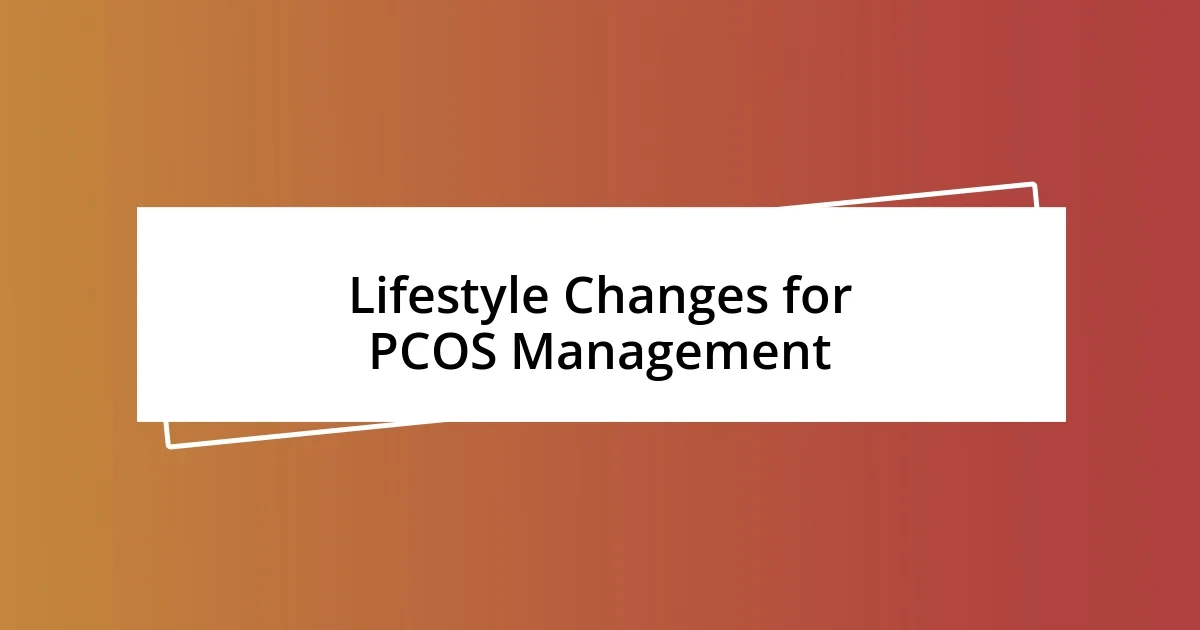
Lifestyle Changes for PCOS Management
Making lifestyle changes can be incredibly empowering when managing PCOS. I found that simply swapping processed foods for more fruits and vegetables transformed my energy levels and mood. Have you ever felt that burst of motivation after eating a wholesome meal? That feeling became my spark to embrace healthier choices.
Exercise, too, became a vital part of my routine, not just for weight management but for stress relief. Initially, exercise felt like a chore I had to conquer, but over time, I discovered that it could also be fun! I started enjoying activities like dancing and hiking with friends. Isn’t it amazing how shifting our mindset can change our approach to something we dread?
Sleep hygiene was another crucial aspect I underestimated. I used to stay up late scrolling through social media, but I quickly learned how important quality rest is for regulating hormones and mood. When I finally committed to a bedtime routine, the difference was night and day—literally! Do you have a nightly ritual that sets the tone for restful sleep? Finding what works for me was a critical turning point in my PCOS journey.
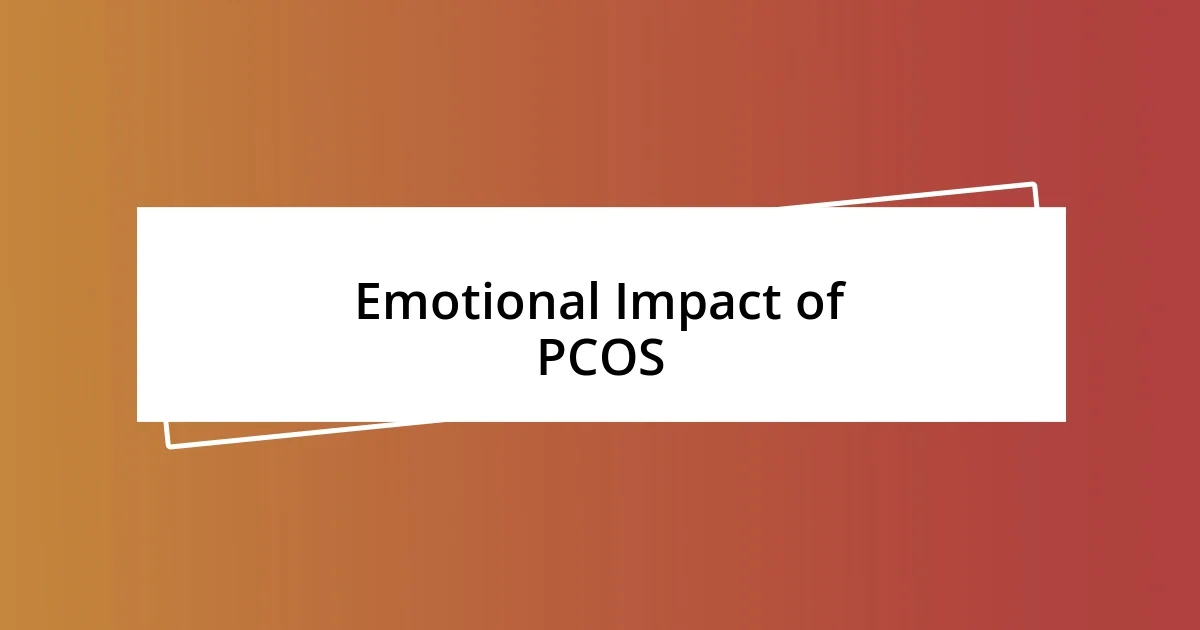
Emotional Impact of PCOS
The emotional impact of PCOS can be profound and often misunderstood. I remember the moments of frustration and sadness when I faced unexpected weight gain or acne flare-ups—I felt like I was losing my sense of self. Can you relate to those struggles? It’s challenging when the body doesn’t reflect how you feel inside, leading to a constant battle between self-acceptance and the pressure to fit societal ideals.
There were days when I simply didn’t want to get out of bed, overwhelmed by feelings of isolation. Sharing my experiences with other women who had PCOS helped me realize I wasn’t alone in this emotional rollercoaster. Have you ever found solace in community? Those conversations became a source of strength, reminding me that vulnerability can be a form of connection, rather than a weakness.
Anxiety and moods fluctuating felt like an unwanted companion throughout my journey. I remember having difficulty concentrating or getting easily irritated, which disrupted my daily life. Finding healthy coping mechanisms, like journaling or mindfulness exercises, truly shifted my perspective. It’s interesting how sometimes just putting pen to paper can clarify those tangled thoughts—has writing ever helped you sort out your feelings? For me, it became both a release and a tool for reflection.
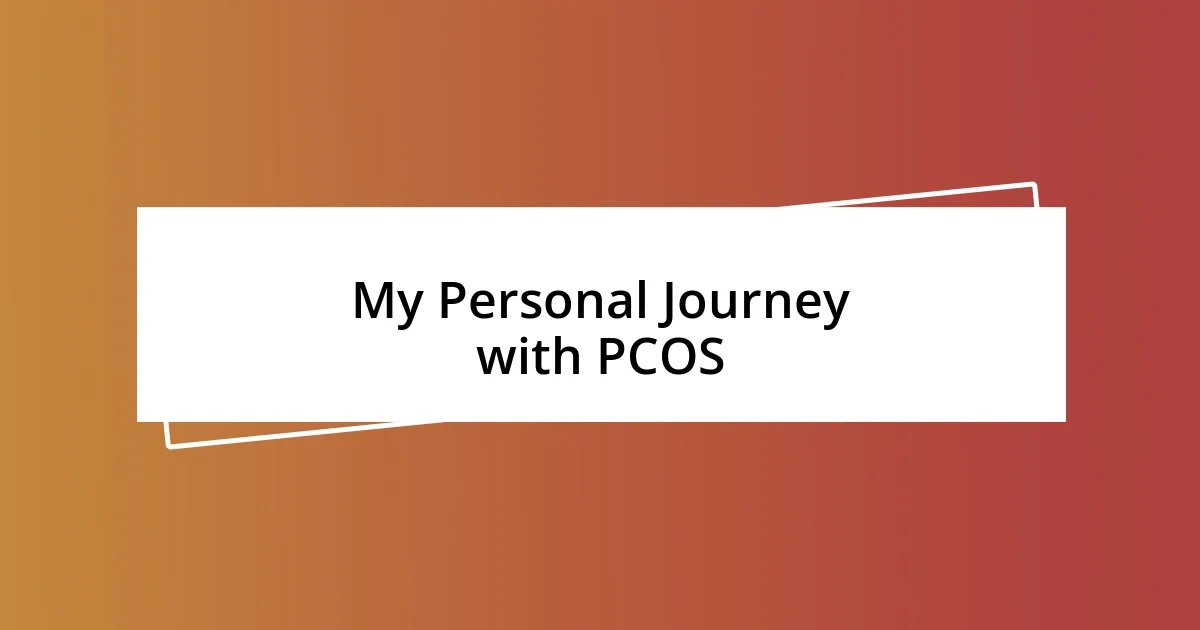
My Personal Journey with PCOS
My personal journey with PCOS has been a mix of challenges and discoveries. I vividly remember the first time I learned about my diagnosis—a whirlwind of confusion followed by an overwhelming sense of relief. Suddenly, my body made sense! I realized that the irregular cycles I had experienced for years weren’t just happening to me; they were part of a bigger picture. Have you ever felt that moment of clarity when everything finally clicks into place?
Navigating PCOS proved to be a path filled with both frustrations and triumphs. I often reminisced about the days when I would look in the mirror and feel disappointment looking back at me due to my changing body. One day, after participating in a supportive group session, I faced my reflection with newfound compassion. I learned to celebrate small victories, like gaining the courage to wear clothes that made me feel good, regardless of the number on the scale. Can you relate to the journey of finding self-love in the midst of struggle?
On the more challenging days, I’d sometimes retreat into solitude, feeling the weight of anxiety pressing down on me. I recall a particularly tough week where my skin became a canvas of breakouts, and it felt like everyone was staring. Yet, amidst those feelings, I discovered the importance of self-advocacy. I started reaching out to my healthcare provider with questions, initiating conversations that led to a tailored treatment plan. It was a lightbulb moment realizing that I had a say in my health journey and that my voice mattered. Have you ever taken that step to advocate for yourself? It’s incredibly empowering to align your treatment with your unique needs.











